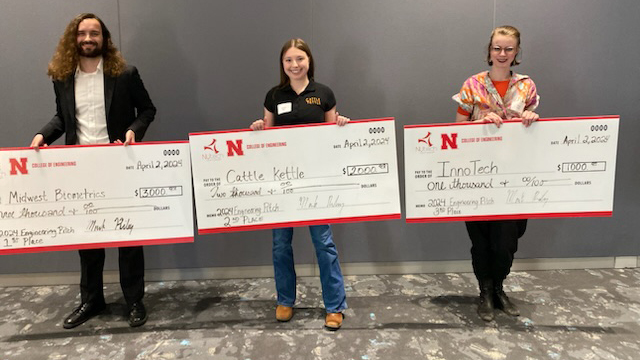
What do a wearable sensor designed to scout out colorectal cancer, a software system that allows ranchers to virtually monitor their cattle troughs, and an advanced wearable textile-based medical monitor have in common?
All were among the winning startup-minded ideas pitched at the 2024 Engineering Pitch Competition, held April 2 at the Willa Cather Dining Complex. The competition’s judges were Kathy Andersen from the Lincoln Partnership for Economic Development, Leandro Castro from Logica, Ashley Clark from Monolith, and John Dineen from HDR.
The annual competition, which debuted in 2018, requires teams of University of Nebraska–Lincoln students, including at least one College of Engineering student, to solve an engineering problem. The judges select winners based on participants’ ability to identify an important problem, formulate a value proposition related to solving that problem, estimate market size and describe their business model.
In first place, earning $3,000: Midwest Biometrics, led by doctoral computer engineering student Patrick McManigal, for his eNose, designed to non-invasively screen users for colorectal cancer.
“Colonoscopies are invasive, expensive and time-consuming, require using a difficult preparation, and often, travel,” McManigal said, adding that the average colonoscopy costs roughly $2,500.
His wearable device is the size of a penny and battery free, and the direct-to-consumer price is estimated at $60 per device. Others on the Midwest Biometrics team include Eric Markvicka, assistant professor of mechanical engineering at UNL; Dr. Stephen Rennard, professor of pulmonary medicine at the University of Nebraska Medical Center, and Jenna Yentes, associate professor of kinesiology, Texas A&M University.
Brooke Bode, a junior mechanical engineering student with minors in math, business, computer science and agribusiness entrepreneurship, nabbed second place and $2,000 for Cattle Kettle, a software system that allows ranchers to monitor tank levels and temperatures remotely and control both with one click.
“Managing pasture cattle is expensive and time-intensive,” Bode said, introducing her target customer archetype: a rancher with 1,500 heads of cattle in rural Nebraska.
In the future, Bode hopes to leverage the power of artificial intelligence, software and cameras to detect fevers and pink eye in cattle.
Third place and $1,000 went to Alyssa Grube, a doctoral graduate student of chemical and biomolecular engineering in the College of Engineering. Grube pitched InnoTech, a self-sustaining, compact, textile-based wearable device that monitors vital patient signs.
Designed to include a heart monitor, oximeter, blood pressure cuff, and thermometer, the devices constantly stand vigil over vital signs, eliminate wires and give users the freedom of movement. When using current technology, gaps in patient monitoring occur, she noted, while patients are moved or using the restroom. Grube’s target market includes cardiothoracic surgeons, anesthesiologists and nurses in patient recovery and overseeing long-term patient care.
The competition was co-sponsored by Monolith, a leader in low-emission carbon black and hydrogen; the University of Nebraska-Lincoln’s College of Engineering, and NUtech Ventures.
More details at: https://news.unl.edu/newsrooms/today/article/mcmanigal-bode-grube-win-engineering-pitch-competition/